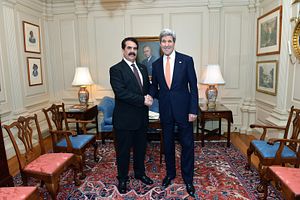David Ignatius’ Washington Post column of October 6 broke the story that senior U.S. policymakers were discussing a “blockbuster” nuclear deal with their Pakistani counterparts. Since then, the idea has received far more attention in Pakistan than in Washington, but with this week’s arrival of Pakistani Prime Minister Nawaz Sharif the story will generate buzz here too. Bottom line: a “deal” of the sort being discussed with Pakistan is less than meets the eye, poorly timed, and likely to prove counterproductive in the near term.
In the abstract, a nuclear deal with Pakistan is not a bad idea. Pakistan’s nuclear program is what vaults the troubled state into a tiny handful of nearly impossible policy challenges that keep policymakers and intelligence analysts worried even when other issues like Russia and ISIS crowd newspaper headlines. Diligent and creative American diplomats are right to explore options for securing and limiting the expansion of Pakistan’s nuclear arsenal.
A recent proposal advanced by scholars at two D.C.-based think tanks to “normalize” Pakistan captures the underlying rationale of the deal under discussion. They argue that Pakistan’s leaders should recognize that their nuclear arsenal is already big enough to deter India, and that since deterrence has always been Pakistan’s goal, now is the time to voluntarily slow the costly program and reconsider Pakistan’s participation in several international arms control agreements—including the Fissile Material Cutoff Treaty and the Comprehensive Test Ban Treaty.
By taking these steps, the report’s authors go on to suggest that the United States and the rest of the world are more likely to sympathize with Pakistan’s deep desire to be mainstreamed into the international nuclear order, just as India has been. Because nearly all U.S. analysts fear that Pakistan and India are on their way to a spiraling nuclear competition that will soon take to the seas in the form of nuclear-armed submarines, heading off a nuclear arms race in South Asia would be a major accomplishment.
Yet a nuclear deal of this sort faces several big problems. First, no matter what Pakistan does to limit its program voluntarily, there is a good chance that India will continue its own military buildup. New Delhi competes not only with Islamabad, but also with Beijing. Any Indian military sized to deal with Pakistan alone would be insufficient to fight China, while any program sized to deal with China would pose a menacing threat to Pakistan. Because Pakistan uses its nuclear program to make up for India’s superior conventional military power, the chances of Islamabad accepting nuclear caps while India’s military grows are slim.
Second, in the unlikely event that Pakistan’s policymakers were to welcome a nuclear deal, it would do too little to address Washington’s most pressing concerns about Pakistan’s nuclear arsenal, which would still pose serious threats, including insider theft, onward proliferation, accident, sabotage, or unauthorized use.
Worst of all, the nuclear discussion shifts attention from the underlying causes of American anxiety with Pakistan and the greatest stumbling blocks to effective partnership between Washington and Islamabad. A comparison with the U.S.-Iran nuclear deal is instructive. Critics of that deal correctly pointed out that it does nothing to address Tehran’s other bad behavior, from imprisoning journalists to sponsoring terrorists. But the pressing need to keep Iran out of the nuclear weapons club—and the hope that a negotiated settlement would accomplish that purpose better than other options—at least offered a plausible rationale for inking the deal. The same cannot be said of a nuclear deal with Pakistan. Pakistan is already a nuclear weapons state. A successful deal would ultimately ratify that condition, not roll it back. Addressing Pakistan’s bad behavior on other fronts is the more pressing requirement.
To be sure, Pakistan is hardly a declared American enemy like Iran. But the U.S. State Department cannot certify that Pakistan’s military has targeted the Haqqani Network of militants that has so viciously attacked U.S., Afghan, Indian, and coalition partners in Afghanistan. Nor do senior U.S. officials believe that Pakistan has seriously tried to go after Lashkar-e-Taiba, the terrorist group best known for its November 2008 commando raid on Mumbai, India that killed 166 innocents.
Pakistan’s current condition raises other fundamental questions about its long-term relationship with the United States as well. Pakistan’s fragile economy remains dependent on outside support, underperforms relative to the needs of a fast growing population of nearly 200 million, and has pinned its future on a massive bailout from Beijing. Pakistan’s political leadership is a civilian democracy in appearance but dominated by the military in all matters of substance. Pakistan’s society is increasingly rent by violent sectarian cleavages and so deeply infected by anti-U.S. and anti-Indian prejudices that it is hard to imagine the emergence of trust-based partnership anytime soon.
These are the topics that really ought to occupy the precious time and attention of U.S. policymakers dealing with Pakistan. There is simply no time for a nuclear deal.
Daniel Markey is a Senior Research Professor at Johns Hopkins SAIS, Adjunct Senior Fellow for South Asia and the Council on Foreign Relations, and author of No Exit from Pakistan: America’s Tortured Relationship with Islamabad.

































